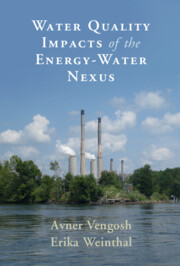Book contents
- Water Quality Impacts of the Energy-Water Nexus
- Water Quality Impacts of the Energy-Water Nexus
- Copyright page
- Contents
- Acknowledgments
- 1 Introduction
- 2 Quantification of Energy and Water Flows
- 3 The Coal–Water Nexus
- 4 Conventional Crude Oil and Tight Oil–Water Nexus
- 5 Conventional and Unconventional Natural Gas–Water Nexus
- 6 Integration
- References
- Index
- Plate Section (PDF Only)
6 - Integration
The Role of Energy in the Anthropogenic Global Water Cycles
Published online by Cambridge University Press: 03 February 2022
- Water Quality Impacts of the Energy-Water Nexus
- Water Quality Impacts of the Energy-Water Nexus
- Copyright page
- Contents
- Acknowledgments
- 1 Introduction
- 2 Quantification of Energy and Water Flows
- 3 The Coal–Water Nexus
- 4 Conventional Crude Oil and Tight Oil–Water Nexus
- 5 Conventional and Unconventional Natural Gas–Water Nexus
- 6 Integration
- References
- Index
- Plate Section (PDF Only)
Summary
This chapter presents the anthropogenic global water cycle: the overuse of natural water resources has led to a water deficit that has been further exacerbated by global warming and increasing drought intensity induced by fossil fuel use, combined with large water use for fossil fuels, increased energy generation for water transfer and treatment, and consequently further water use and impact on depleting water resources. The chapter presents a new assessment of global water withdrawal and consumption and wastewater for the different stages of fossil fuel production and consumption, using the most updated information on water intensity and energy production. The chapter highlights the high magnitude of the impaired water intensity derived from water contamination on a global scale. The chapter explores the global emission of carbon dioxide, water vapor, and methane from fossil fuel operations, including natural gas flaring. The chapter evaluates the energy use for water transport, wastewater treatments, and desalination, emphasizing that future water quantity and quality deterioration would require additional treated water and thus additional energy sources that would further exacerbate the anthropogenic water cycle. Finally, the chapter discusses the options for a clean future and transition to renewable energy sources with much lower water intensity and environmental impacts.
Keywords
- Type
- Chapter
- Information
- Water Quality Impacts of the Energy-Water Nexus , pp. 215 - 261Publisher: Cambridge University PressPrint publication year: 2022

